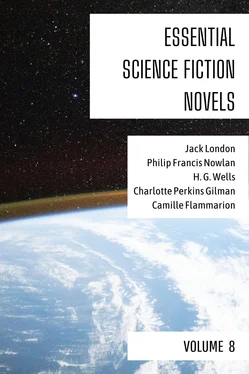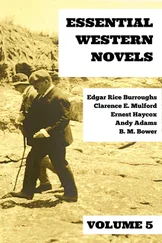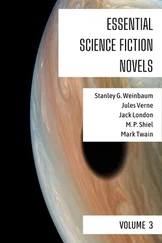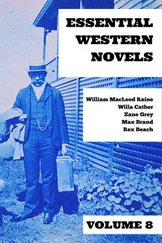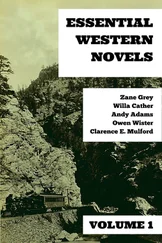This abiding-place was a splendid strategic selection. It was a peninsula, protected on three sides by the curving river. On only one side was it accessible by land. This was the narrow neck of the peninsula, and here the several low hills were a natural obstacle. Practically isolated from the rest of the world, the Fire People must have here lived and prospered for a long time. In fact, I think it was their prosperity that was responsible for the subsequent migration that worked such calamity upon the Folk. The Fire People must have increased in numbers until they pressed uncomfortably against the bounds of their habitat. They were expanding, and in the course of their expanding they drove the Folk before them, and settled down themselves in the caves and occupied the territory that we had occupied.
But Lop-Ear and I little dreamed of all this when we found ourselves in the Fire People’s stronghold. We had but one idea, and that was to get away, though we could not forbear humoring our curiosity by peeping out upon the village. For the first time we saw the women and children of the Fire People. The latter ran for the most part naked, though the former wore skins of wild animals.
The Fire People, like ourselves, lived in caves. The open space in front of the caves sloped down to the river, and in the open space burned many small fires. But whether or not the Fire People cooked their food, I do not know. Lop-Ear and I did not see them cook. Yet it is my opinion that they surely must have performed some sort of rude cookery. Like us, they carried water in gourds from the river. There was much coming and going, and loud cries made by the women and children. The latter played about and cut up antics quite in the same way as did the children of the Folk, and they more nearly resembled the children of the Folk than did the grown Fire People resemble the grown Folk.
Lop-Ear and I did not linger long. We saw some of the part-grown boys shooting with bow and arrow, and we sneaked back into the thicker forest and made our way to the river. And there we found a catamaran, a real catamaran, one evidently made by some Fire-Man. The two logs were small and straight, and were lashed together by means of tough roots and crosspieces of wood.
This time the idea occurred simultaneously to us. We were trying to escape out of the Fire People’s territory. What better way than by crossing the river on these logs? We climbed on board and shoved off. A sudden something gripped the catamaran and flung it downstream violently against the bank. The abrupt stoppage almost whipped us off into the water. The catamaran was tied to a tree by a rope of twisted roots. This we untied before shoving off again.
By the time we had paddled well out into the current, we had drifted so far downstream that we were in full view of the Fire People’s abiding-place. So occupied were we with our paddling, our eyes fixed upon the other bank, that we knew nothing until aroused by a yell from the shore. We looked around. There were the Fire People, many of them, looking at us and pointing at us, and more were crawling out of the caves. We sat up to watch, and forgot all about paddling. There was a great hullabaloo on the shore. Some of the Fire-Men discharged their bows at us, and a few of the arrows fell near us, but the range was too great.
It was a great day for Lop-Ear and me. To the east the conflagration we had started was filling half the sky with smoke. And here we were, perfectly safe in the middle of the river, encircling the Fire People’s stronghold. We sat and laughed at them as we dashed by, swinging south, and southeast to east, and even to northeast, and then east again, southeast and south and on around to the west, a great double curve where the river nearly tied a knot in itself.
As we swept on to the west, the Fire People far behind, a familiar scene flashed upon our eyes.
It was the great drinking-place, where we had wandered once or twice to watch the circus of the animals when they came down to drink. Beyond it, we knew, was the carrot patch, and beyond that the caves and the abiding-place of the horde. We began to paddle for the bank that slid swiftly past, and before we knew it we were down upon the drinking-places used by the horde. There were the women and children, the water carriers, a number of them, filling their gourds. At sight of us they stampeded madly up the run-ways, leaving behind them a trail of gourds they had dropped.
We landed, and of course we neglected to tie up the catamaran, which floated off down the river. Right cautiously we crept up a run-way. The Folk had all disappeared into their holes, though here and there we could see a face peering out at us. There was no sign of Red-Eye. We were home again. And that night we slept in our own little cave high up on the cliff, though first we had to evict a couple of pugnacious youngsters who had taken possession.
The months came and went. The drama and tragedy of the future were yet to come upon the stage, and in the meantime we pounded nuts and lived. It—vas a good year, I remember, for nuts. We used to fill gourds with nuts and carry them to the pounding-places. We placed them in depressions in the rock, and, with a piece of rock in our hands, we cracked them and ate them as we cracked.
It was the fall of the year when Lop-Ear and I returned from our long adventure-journey, and the winter that followed was mild. I made frequent trips to the neighborhood of my old home-tree, and frequently I searched the whole territory that lay between the blueberry swamp and the mouth of the slough where Lop-Ear and I had learned navigation, but no clew could I get of the Swift One. She had disappeared. And I wanted her. I was impelled by that hunger which I have mentioned, and which was akin to physical hunger, albeit it came often upon me when my stomach was full. But all my search was vain.
Life was not monotonous at the caves, however. There was Red-Eye to be considered. Lop-Ear and I never knew a moment’s peace except when we were in our own little cave. In spite of the enlargement of the entrance we had made, it was still a tight squeeze for us to get in. And though from time to time we continued to enlarge, it was still too small for Red-Eye’s monstrous body. But he never stormed our cave again. He had learned the lesson well, and he carried on his neck a bulging lump to show where I had hit him with the rock. This lump never went away, and it was prominent enough to be seen at a distance. I often took great delight in watching that evidence of my handiwork; and sometimes, when I was myself assuredly safe, the sight of it caused me to laugh.
While the other Folk would not have come to our rescue had Red-Eye proceeded to tear Lop-Ear and me to pieces before their eyes, nevertheless they sympathized with us. Possibly it was not sympathy but the way they expressed their hatred for Red-Eye; at any rate they always warned us of his approach. Whether in the forest, at the drinking-places, or in the open space before the caves, they were always quick to warn us. Thus we had the advantage of many eyes in our feud with Red-Eye, the atavism.
Once he nearly got me. It was early in the morning, and the Folk were not yet up. The surprise was complete. I was cut off from the way up the cliff to my cave. Before I knew it I had dashed into the double-cave,—the cave where Lop-Ear had first eluded me long years before, and where old Saber-Tooth had come to discomfiture when he pursued the two Folk. By the time I had got through the connecting passage between the two caves, I discovered that Red-Eye was not following me. The next moment he charged into the cave from the outside. I slipped back through the passage, and he charged out and around and in upon me again. I merely repeated my performance of slipping through the passage.
Читать дальше
